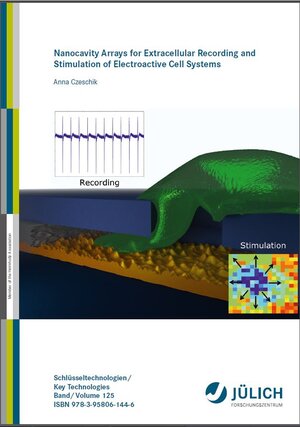
×
![Buchcover ISBN 9783958061446]()
Nanocavity Arrays for Extracellular Recording and Stimulation of Electroactive Cell Systems
von Anna CzeschikMicroelectrode arrays (MEAs) are state-of-the-art devices for extracellular
recording and stimulation of biological tissue. Furthermore,
they are a relevant tool for the development of biomedical applications
like retina, cochlear and motor prostheses, cardiac pacemakers and
drug screening. Hence, research on functional cell-sensor interfaces, as
well as the development of new surface structures and modifications
for improved electrode characteristics, is a vivid and well established
field. Combining single-cell resolution with sufficient signal coupling
remains challenging due to poor cell-electrode sealing. Furthermore,
electrodes with diameters below 20 μm often suffer from a high electrical
impedance affecting the noise during voltage recordings. In
this study, a nanocavity sensor array with nanostructured electrodes
for voltage-controlled stimulation and extracellular action potential
recordings on cellular networks is presented. [...]
recording and stimulation of biological tissue. Furthermore,
they are a relevant tool for the development of biomedical applications
like retina, cochlear and motor prostheses, cardiac pacemakers and
drug screening. Hence, research on functional cell-sensor interfaces, as
well as the development of new surface structures and modifications
for improved electrode characteristics, is a vivid and well established
field. Combining single-cell resolution with sufficient signal coupling
remains challenging due to poor cell-electrode sealing. Furthermore,
electrodes with diameters below 20 μm often suffer from a high electrical
impedance affecting the noise during voltage recordings. In
this study, a nanocavity sensor array with nanostructured electrodes
for voltage-controlled stimulation and extracellular action potential
recordings on cellular networks is presented. [...]


